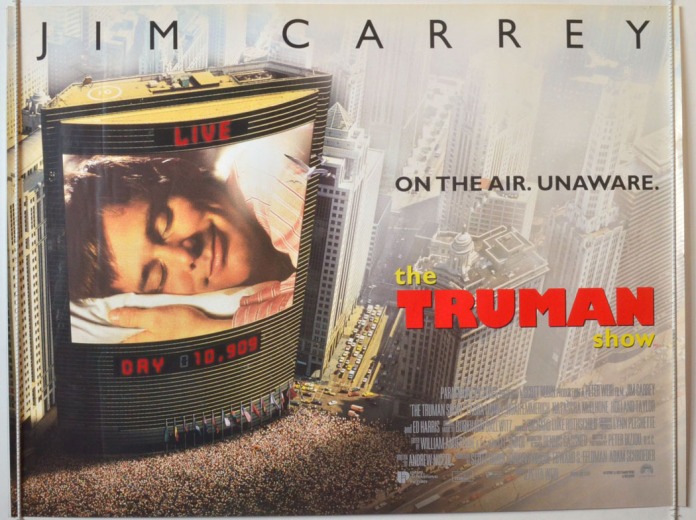
Okay, the Truman Show! It was released in June of 1998, so this is a 20th anniversary celebration of what we consider one of the finest films from the 1990s. Peter Weir was the director, and in a bold move he was insistent Jim Carrey would be perfect for the role.
Carrey signed up in 1995 but was busy shooting goofball comedies the Cable Guy and Liar Liar, so production was delayed for over a year. To get his big break into a dramatic role, he also took a pay cut from $20 million to just $12 million. Spartan times, eh, Jim?
The idea of Carrey starring in a dramatic role drew a lot of skepticism at the time. He’d become a huge star thanks to his rubbery faced antics in the ridiculous Ace Ventura films, The Mask, and Dumb and Dumber had cemented his status as a comedy God.
But… drama?! Well, there are brief moments in Liar Liar (and even Dumb and Dumber) where you can see Carrey’s dramatic heft in action, so it’s not overly surprising it all joined together magnificently.
The Truman Show
Right, synopsis time! Truman Burbank (Carrey) is the unsuspecting superstar of an enormously popular, 24 hour a day reality TV show.
It was created, and is overseen, by Christof (Ed Harris) who watches over everything like a God. Almost literally! He and his directors in the production suite are located above Truman’s world. Christof can, and readily does, manipulate events to ensure:
- Truman doesn’t find out he’s in a TV show
- Make sure the show remains entertaining so viewing figures don’t plummet
Christof has been doing this all of Truman’s life, with some morally messed up “incidents” in his youth haunting Truman as he approaches middleage.
The main one here is the “death” of his father in a boating accident, which has left him with a severe phobia of water.
This is used against him consistently throughout the show to keep him in the enormous arcological dome called Seahaven Island – it’s essentially a mega studio, an entirely synthetic world where everyone Truman meets is an actor, except himself.
Of course, this means thousands of cameras are positioned around the fictional world to watch the star’s every move.
Early in the film we see a young Truman become best mates with Marlon (played by an actor called Louis Coltrane, who is played by the real actor Noel Emmerich – confusing, yeah?) and fall in love with a girl called Lauren (this is the actress Sylvia, who is played by Natascha McElhone).
Christof doesn’t want this, though, so Truman is sort of coerced into marrying Meryl Bubank, with the actress really called Hannah Gill, played by the lovely, super talented Laura Linney. As you can see below, the facade Gill has to keep up, matched by Truman’s growing disinterest in her, leads to the actress having a breakdown on live on air.
What follows is Truman’s increasing realisation something isn’t quite right. After a series of mishaps and strange errors on the part of film crew members, he gets suspicious about the nature of the world he’s in.
This prompts some erratic behaviour, which leads to Gill’s breakdown above, which triggers off Truman’s epic fight for discovering the truth.
It’s an excellent film and was a huge step forward for Carrey in his career, but the supporting cast of Linney, Harris, Emmerich, and McElhone helped to create a disturbing world where everything has a fake sheen to it.
It’s all a facade, the only person who doesn’t know is Truman. This is all so cleverly conceived and executed by Weir, with sharp editing and cinematography, it seems more unique now than it did in 1998.
However, the real stunner here is the film preceded all of the tedious reality TV show crap which kicked off circa 2000, and rumbles on to this day. The Truman Show is, then, a prescient look at fame, privacy, and the nature of humanity.
It was a satire way ahead of its time, which channeled Philip K. Dick’s lifelong obsession with a warped reality and delivered a moving and highly entertaining one hour and forty minutes.
Truman Themes
It was a big success – costing $60 million, it easily more than double that, but along with the critical and commercial acclaim came the need for people to study it.
Indeed, people are still discussing the Truman Show. It’s even been analysed based on themes such as Christianity (there are also the obvious comparisons between Christof and God, or an Antichrist), metaphilosophy, existentialism, and simulated realities.
There was even an essay published in the International Journal of of Psychoanalysis in 2008 discussing Truman Burbank. Michael Brearley and Andrea Sabbadini state of his situation:
"Behind the blandness and the comedy of Truman's situation, partly because of the blandness, this is a chilling film. A good part of the chill comes from the falseness of Truman's world even taken at face value, that is, even without the dimension of frank manipulation. It is as if human relations had been reduced to soap opera dimensions; as if this horrifically antiseptic soap had become reality."
As with other films (Groundhog Day rings a bell here), you can make of it what you want. It can be life-affirming, uplifting, a bleak analysis of human foibles, or a prophetic look at the future of the world.
Whatever – you’ll take something out of the film, even if you just want to sit back and root for Truman in the emotional final few minutes. It’s cinema at its best. You go, girl!

What a fantastic movie. It really makes me want more Jim Carrey in serious roles… but not too serious? Like, somehow the absurdity of paranoia and insanity fit him so well. Great post =)
LikeLike
Cheers! Yeah, he’s fantastic in this film. He was terrific in Eternal Sunshine as well, but the absurdity and paranoia really suited his style. Robin Williams was briefly considered, I believe, but it’s Carrey’s film!
LikeLiked by 1 person
Not a Jim Carrey fan but this movie stands out from the others and I found it delightfully well done and a bit disturbing! Go Jim.
LikeLiked by 1 person
Ja, it was a bit disturbing. But also quite uplifting. Ja.
LikeLiked by 1 person
Ja, it was.
LikeLiked by 1 person
Ja. I’ll be back.
LikeLiked by 1 person
okay.
LikeLike